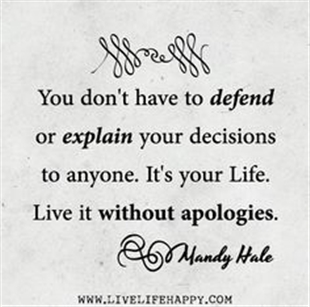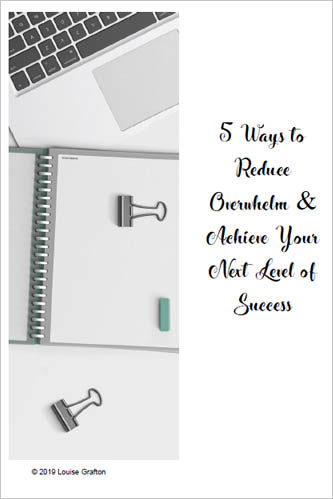Loving someone doesn’t mean controlling them
Loving someone doesn’t mean controlling them
Jill Coleman wrote a very powerful post on her Facebook page this week about how when you love someone you shouldn’t be trying to control them. You’ll find the post at the end of this blog.
I'm making some decisions in my life at the moment (& have done so in the past as well) that not all friends, family, colleagues necessarily agree with and/or are happy about but I've always hoped that they respected and will continue to do so, these decisions I make and yes support me as best as they can, even when they may not quite go according to plan.
Telling others what to do
How many times has someone told you about a decision that they’re making and you’ve ended up telling them what they should or shouldn’t do, expecting them to take heed and do what you advise. Then when they haven’t and they’ve gone ahead and done what they’ve wanted to do you’ve mentioned that it could all go wrong and they really should have listened to you, as it might well come back to bite them. And … then … perhaps it doesn’t go as they’d hoped do you then say I told you so?
Others telling you what to do
Have there been times when you’ve been in the midst of trying to make a decision and people have tried to persuade you one way or another? And then not necessarily been terribly supportive when it didn’t turn out as you or they’d hoped?
Avoid controlling others
It’s hard when it’s someone you love and care about and maybe you do have an insight into how things will turn out, and maybe you mean well. Perhaps the decision will also affect you in some way, if you allow it to do so, but sometimes you need to take a step back and allow that person to make the decision that they feel is right for them at that time, and be as unconditionally supportive as you can be. Unless it is a potentially life threatening decision (and even then proceed with caution) it isn’t right, fair or justified to try to control another person’s life.
Becoming independent decision makers
We bring our children up to be, hopefully, independent adults through trusting them to gradually make their own decisions in life and working through the resulting consequences whether good or bad. This enables them to become independent, capable, confident in their abilities and choices, and helps them to grow, to develop, to learn and evolve.
If we don’t allow this to happen, and we try to keep a control of our children as they grow up (and even as adults), then, as I’ve actually seen happen more and more often, they grow into adults who are unsure of how to actually make decisions, who question decisions they make, who stay more dependent upon their parents and others as they get older, and, if they do make choices, they are not always able to manage the outcomes. They also find it hard to perhaps even be happy with decisions/choices that they make, that have turned out okay, as there is still that element of doubt that exists as to whether or not they were right to go ahead as it caused upset to someone else.
Allowing freedom in decision making
To grow as human beings, to learn about ourselves and our place in the world, to develop confidence, to not be fearful, we have to be able to be given space and time to make our own decisions and choices and be able to learn to cope with what happens as a result of doing so. We also have to allow others to do the same as they too need to learn, grow and evolve to be able to reach, and fulfil, their own potential as confident, self-assured human beings, and to be able to play a part in, and contribute to, society as a whole.
When we are trying to control the decisions or choices that others make it is often, as Jill says, our own fears and insecurities being played out. We fear what could happen, perhaps because of something that we’ve been through ourselves or because of our own fears of the future. We may well have wanted to make particular decisions ourselves but were afraid to do so and we project these fears onto other people, hoping that they don’t go through with them because if they did so, and it turned out okay, then it just shows us up for being scared and fearful.
If others try to control decisions/choices you are making listen, take on board what they are saying (if it is someone whose opinion matters to you), thank them for their input, but remember ultimately it is you who has to make the decision, it is your life, you have to live it so make sure you do what you believe is right for you and is in line with your values, morals and beliefs. If it goes right that’s great, if it doesn’t quite work out quite as planned that’s okay too as you will learn from it and move forward. Don’t give away your control and allow this to happen, this is not only a disservice to you but also to the person trying to control your decisions and choices.
If someone you love and care about is in the process of having to decide about something then advise, guide if asked or required but then step away and let that person make the decisions and choices that they think are best for them, and fully, unconditionally, support them as they do so but, again like Jill says, ‘release attachment’ from how they proceed. Be there for them whether they succeed, fail or somewhere in-between - they are probably feeling vulnerable enough about going ahead with their decision/s and maybe concerned about the outcome, but they feel it's the right thing to do for them at that time.
This also helps you to grow and develop as a person as you are learning to move aside and be there for someone else when you may not necessarily agree with what they are doing.
Remember we all make decisions and choices in life that we may be scared of, that others may or may not agree with, that we’re not so sure of the outcome and we feel unsure about but we feel it has to be done. Nobody is perfect, nobody makes perfect decisions all the time and everybody has to fail at some time or another in order to progress, to learn, to move forward.
‘You don’t have to explain or defend your decisions to anyone. It’s your life. Live it without apologies.’ Mandy Hale
Copyright © 2016 Louise Grafton-Mitchell. All rights reserved. No part of this Blog shall be reproduced in any form or by any means, electronic or mechanical, including photocopying, recording, or by any information retrieval system without written permission of the publisher.
………………………………………………………………………………………………………………………………………………….
And this is Jill’s blog which inspired mine this week - for further information about Jill Coleman check out her website www.jillfit.com and her facebook page - https://www.facebook.com/JillFit/?fref=ts
Chatting with my bro Danny Coleman last night about "allowing people to have the full experience." I get a little heated about this topic ;)
I think back to times when I tried to give others advice or when people have tried to warn me or dissuade me from doing things: "That will never work." "Don't you think you should do this instead?" "But what will you do if it doesn't work out?"
Thank you, and ... I don't know if it will work. I don't know if I should do that other thing. I don't know what I'll do if it doesn't work out.
BUT.
What I do know is that every time I put myself in a position of not-knowing, and then DO IT ANYWAY, not only do I learn and grow (even through failure!) but now I have a show of evidence that I can handle shit. And I'm not as scared as I used to be.
We need those moments. We need the moments of *doing* even when we're scared, unsure, uncertain and--probably hardest of all--when not everyone supports us.
Because it gives us the opportunity to build self-trust, experience and COMPETENCY, all of which matters for confidence-building.
Think your friend or family member is messing up? IMO, you kind of have to let them.
Because what's the alternative? Trying to control something that's really not yours to control.
Assuming your way is better is a little arrogant. Expecting them to do what you'd do is short-sighted.
Because they're *not* you, and they have just as much right to hardship (or, gasp! success, happiness, fulfillment, etc) as you do.
Sure, if they ask for your advice, give it to them honestly. And then release attachment to whether or not they take it, it's not your job to manage that.
And even consider that it might be your own fears and insecurities that are talking?
And if they do the thing you're scared they will, then fucking support them. You say they're your friend, you say you love them, then show up as best you can for them.
Because it's not about you. And taking something someone else does personally (if it doesn't actually impact you) is selfish.
Loving someone doesn't mean controlling them??
The 5-day #MindsetSkillset School starts tomorrow! And it's free, so I'd love if you'd share this with someone you think could use these messages - it would be a huge favor to me????
Enroll here--> http://bit.ly/mindsetskillset
#RadicalResponsibility #MindsetMakeover



